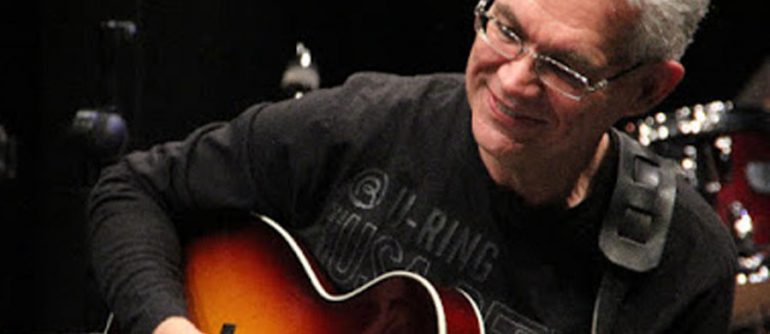This article is dedicated to my dear friend, Garrison Fewell, who passed away from cancer two years ago. I had the opportunity to spend time with him in Boston during the last year of his life. I hadn’t seen Garrison for 30 years up until that time. When I had first known him, he was just starting off his career as an instructor at Berklee College of Music and was gigging around Boston. He established himself in those 30 years- time as an international recording artist who traveled throughout Europe playing jazz, he became a full-time professor at Berklee College of Music, and he had recently written a masterful book called Outside Music, Inside Voices. Garrison had a brilliant mind that always probed and questioned the inner workings of life. He had a profound and enriched soul that knew no boundaries or limits. Here is my article reviewing his knowledgeable and artistic inquiry on Improvisation, Spirituality and Music.
You do not have to be a musician to read this book. You do not have to listen to improvisational music. You do not have to know who the artists are that Garrison Fewell interviews. However, your profile might read: one who is seeking spiritual insights, one who is fascinated by the creative process, one who delights in how artistic movements in the history of man influences our culture.
The author welcomes us to read his book by saying, “Everybody who lives and breathes is spiritual. You have your body. You have your spirit. Put the two together, you have a human.”
Fewell’s insights into spirituality and music are illuminating. He has thoroughly researched his subject with a professorial integrity yet he writes with an open, spontaneous freedom capturing the imagination and intellect. The use of dialoguing with the musicians creates a relaxed forum of expression, which helps the interviewer and artist explore the depths of the subject: “How do you define spirituality and what role does it play in your life and music?” The author asked 25 musicians from all over the world this question.
I, on the other hand asked Garrison Fewell what was his spiritual journey in writing this book and had the opportunity to dialogue with him in a similar fashion as he used when interviewing the musicians. Strangely enough, back in 1977, when Garrison played his guitar recital at Berklee College of Music, I sat in the audience as a reporter for a Buddhist newspaper called the “World Tribune” covering him in order to pen an article about how his life was influenced by the Buddhist philosophy and how he overcame obstacles as a musician by using this spiritual practice. This was the beginning of his spiritual journey.
Now, 37 years later, I am still interested in how this talented, articulate, teacher of guitar and music theory, performing jazz musician and recording artist, arranger and composer, lives his life.
Garrison commented, “My own spiritual journey taught me this. The development of your life as a human being is the expression of your music, so if you expect to move others with the music you play, it really comes down to the inner development as a human being, not the technical.”
This man is a shining example of developing his inner self as he fights the battle of cancer while still actively pursuing his roles as professor of guitar at Berklee School of Music, author, performing jazz artist, father and husband. Nothing seems to deter Garrison’s hopeful spirit in imparting his knowledge and wisdom to his students, audiences who listen to his music, and now all his new fans who will read his book.
He began writing “Outside Music, Inside Voices” back in January 2012 after encouraging a renowned photographer friend, Luciano Rossetti, to publish a photo book on jazz musicians. “I asked Luciano how come you never did a book with all the photos you took? So then I asked myself, why don’t I write a book?”
Garrison the author of 4 books on Jazz Music theory, felt it was time to explore the significance of “free music” which was the form of jazz he was now playing. His roots began in the blues and he didn’t even know how to play jazz when he first attended Berklee College. When graduating Berklee, he considered himself a straight ahead jazz musician but in 2003 he switched his style to creative improvised music. Garrison writes in the Introduction of his book explaining this type of jazz, “Improvisation is a way of life that involves all the senses and requires a total surrender to the moment. In French I often use the expression “J’apprecie l’instant du moment” to describe being in the moment – literally an instant within a moment.”
Asking himself what the title and theme would be in writing this piece, Garrison said he was inspired by the literal translation of what creative improvised music meant. “This music is also called outside music because it goes against what’s normally listened to in the music world. It’s not commercial music; it has been called free jazz, avante guard jazz. It’s outside the mainstream.” Then at the other side of his idea was the inside voices of the actual musicians who play this form. Time to give them a platform to speak about their musical knowledge and philosophy on spirituality.
Garrison decided that evening in Italy, to write his book. Playing on the words outside and inside, he came up with “Outside Music, Inside Voices.” He also recruited Luciano to take the pictures of the artists. His first interview was with a dear friend whom Garrison had played with over the years, John Tchai. Tchai came to New York in the 1960’s from Denmark looking to join the jazz scene in the United States. He ended up on John Coltrane’s album, “Ascension” as an alto sax player.
Coltrane was just beginning to experiment with this new form of free jazz and a Revolutionary Movement stirred in the hearts of musicians who wanted to liberate themselves from the customary rules of playing jazz. Fewell highlights this time in jazz’s history and parallels what was happening in this movement of “free music” to what was going on politically and socially in the United Sates at the time. “These musicians in the 60’s struggled to lay the foundation for this music which is part of societal, political and social changes with an upheaval that was happening through the Civil Rights, Human Rights movement.”
Unfortunately, John Tchai died of a stroke, October 7th 2012, 10 months after Garrison interviewed him. 4 months later, Garrison received a cursed fate. He was diagnosed with stage four colorectal cancer with metastasis to his liver. He needed immediate surgery. He remembers making a determination, “When I awoke in the hospital after surgery, I was alone with my thoughts. I started chemotherapy treatment for 6 months and determined to complete the dialogues during that time.”
Although this book does not focus on Garrison’s journey fighting his illness, his work is a testament, a legacy to the music that nabbed his heart after being a successful recording artist in the straight ahead jazz scene. He believes and applies the concept that creative improvised music is a healing power and fortunately has experienced the miraculous results in his life.
After taking a break from playing his guitar because the chemo rendered him so weak, he returned back to his instrument. “I didn’t play music for several months, but when I started again; it was amazing to feel the tremendous healing power of creative improvised music.” This author revealed in his Introduction.
Displaying an unwavering determination to finish his book despite his chemo treatments, Garrison began his dialogues by either meeting the musician in person, talking with the artist on the phone or lastly, communicating through email. “My thoughts were to have dialogues and really participate with each musician, I would listen but also respond so we could both respond to each other through our experience.”
After interviewing over 20 musicians Garrison understood one fact. Even if a musician purported not to have a spiritual practice or belief system, somehow the essence of the artist flowing out of their music had a spiritual quality to it. A Dutch musician said very bluntly to Garrison, “I’m not into spirituality.” But this author noticed that the same musician loved playing music for children and children loved his music; therefore the spiritual element was there.
Writing a book on spirituality seems to have been this man’s destiny as I reviewed his own pilgrimage into a life long interest of personal development. At the age of 18 Garrison made a world tour of Israel, Afghanistan, Pakistan and other countries where the “silk road” traveled. He tells a mystical story of how he went inside the foot of a huge Buddha that was actually a temple. He wound his way up the Buddha’s body until he delivered himself out of the Buddha’s shoulder. “I had a deja vu experience.” Garrison reveals, his demeanor now radiating awe like that young man who stood peering out at the reverent scene. “Although it was summer and very hot, I felt cold …freezing. I saw snow everywhere. I was dressed in a robe. I knew, and had observed that the pictures of people on the walls had had their eyes cut out by the Muslims, but I saw the pictures with all the people’s eyes painted in. Then, it was sunshine again and my deja vu was over.”
Two years later, Garrison became a Buddhist. He has been practicing Buddhism since the early 70’s and chants Nam Myo-Ho Renge Kyo which means: devotion to the mystical laws of the universe through cause and effect through sound. In the Introduction to “Outside Music, Inside Voices”, Garrison tells us how he uses this practice for enhancing his spirit for being a teacher, musician, a human being. “I chant Nam Myo-Ho Renge Kyo to harmonize my life with the cosmic life force inherent in my own life, all living beings and the universe. I chant to bring forth wisdom and compassion, to listen deeply and respond to the musicians I’m playing with, and to connect with the audience in a mutual effort to transform the moment into a positive experience for everyone.”
Garrison Fewell, guitarist, author, educator, and composer has had an outstanding career.
He has taught at Berklee College of Music for 37 years and also taught in over 50 European conservatories, plus being a clinician for the International Association of Jazz Educators. Performing all over the world with his own band and releasing 15 recordings over his career, this artist operates on the philosophy of “right mindfulness”. “You live everyday not dependent upon what happened yesterday. In every moment there is eternity – what’s happening now.”
This statement above reminded Garrison of a joke that’s called “The Buddhist Hamburger.” Again, his face lights up with the aura of a Master Yogi imparting his wisdom upon us mortals. “The joke goes like this,” says Garrison. A guy walks into a restaurant after seeing a sign that says hamburgers are two dollars today but free tomorrow. He doesn’t eat the hamburger that day because he wants to get the free one tomorrow. When he goes back to the restaurant and asks for the free hamburger, the owner says that will be 2.00. The guy is taken aback because it was supposed to be free so he says; your sign yesterday advertised that the hamburger was free tomorrow. The owner smiled and said today is tomorrow so that will be 2.00.” The Buddha smile rests on Garrison’s face. “Today is tomorrow. The future…it’s this moment.”
For more information on Garrison Fewell and his book: http://garrisonfewell.com/outside-music-inside-voices/






